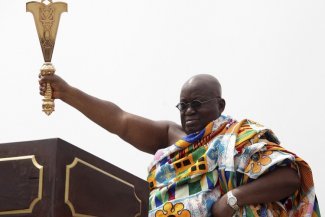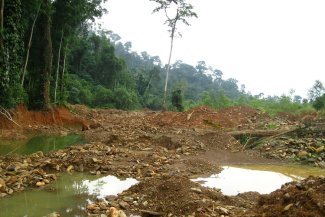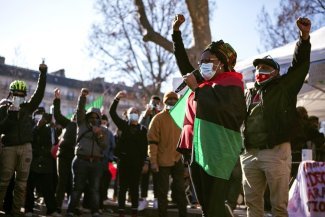Calls for a new constitution featured during the 5 November 2022 protests in Accra, Ghana, demanding the resignation of President Akufo-Addo.
Namata Serumaga-Musisi, a member of the grassroots political movement the Economic Fighters League, lets out a sigh as she recalls an interaction between a fellow Ugandan and Ghana’s president Nana Akufo-Addo at Harvard University in 2019. This student made headlines for saying he would happily swap Akufo-Addo for Uganda’s Yoweri Museveni, who has held a vice-like grip on power in the East African country since 1986.
Serumaga-Musisi, who has made Ghana her home over the last decade, understood the sentiment of the Ugandan student, who was drawn by the sheen of Ghana’s much-heralded democracy. But she also suspected that the fawning over Akufo-Addo would not last. “There has been a very interesting performance of democracy in Ghana,” says Serumaga-Musisi. “We are on the same trajectory [towards authoritarianism as Uganda]. It is just that Uganda is further down the path.”
In the period since the incident at Harvard University, the Akufo-Addo government has been rocked by corruption scandals, experienced a relatively violent election period in 2020, and has overseen an increased military footprint in civilian affairs. Currently, Ghana is experiencing its worst economic crisis in about three decades: the country is saddled with debt and is now spending over 70 per cent of its revenue on interest payments, in addition to inflation being at a 21-year high of 50.3 percent (as of 14 December 2022).
This inflation has been largely driven by forex challenges, which saw the local cedi depreciate by as much as 50 per cent against the dollar in 2022. The struggles of the cedi made a mockery of the recent increase of Ghana’s minimum wage from GH¢12.53 to GH¢14.88. About a year ago, GH¢12.53 was equivalent to over US$2. At the time of writing, the new minimum wage is worth about US$1.5.
This convergence of political and economic crises drove over 1,000 young Ghanaians onto the streets on 5 November 2022 to demand the resignation of President Akufo-Addo and his equally beleaguered finance minister, Ken Ofori-Atta.
Previously, protests in Ghana have generally targeted specific issues, like the #DumsorMustStop protests in response to the country’s ongoing power crisis, or the more recent #FixTheCountryNow protests in 2021, which called for socio-economic reform. But this is the first time that protesters have explicitly called on a president to resign.
The protesting youth were accused of disrespect, as Ghanaian cultural norms dictate that elders and people in positions of authority must always be treated with deference. This was embodied by a respected financial analyst going on his knees on TV to beg Akufo-Addo to fix the economy, just days before droves of young Ghanaians, many of them first-time protesters, took to the streets.
A change of pace in protest culture
Although Ghana’s cedi has started to rally against the dollar (in anticipation of the country receiving US$3 billion in International Monetary Fund support), which has pushed down fuel prices, Ghanaians spent most of 2022 reeling under a barrage of price hikes. The cost of housing, water, gas and electricity, went up by 79.1 percent (as of 14 December 2022), according to the Ghana Statistical Service. Meanwhile, inflation of food and non-alcoholic beverages was at 55.3 per cent. These are some of the issues that were on the mind of protesters who demanded Akufo-Addo’s resignation.
“I am here because I feel everything has gone down the drain. I am here because I can’t pay my children’s school fees,” fumed businesswoman Mulaika Salisu during the protest.
Protesting to demand the President’s removal was unprecedented for her, but still the logical outcome of the equally unprecedented economic hardship that she was experiencing. “I could have slept at home, but I feel I have to come and contribute,” she added.
People’s traditional reluctance to protest is part of a civic political culture that Serumaga-Musisi has been working to challenge during her four years with the Economic Fighters League, which was formed in 2016 and has about 100,000 registered members. These are systems, she says, “designed to deprive the people of their power.” The movement holds the belief that Ghana’s elections, with Akufo-Addo’s New Patriotic Party and the National Democratic Congress as the recurring forerunners, are merely a contest between two sides of the same coin. The two parties have been responsible for the same socio-economic failings over the years, like corruption and fiscal indiscipline.
Noah Nathan, an associate professor of political science at the Massachusetts Institute of Technology in the United States, has researched Ghana’s democracy over the last 15 years. He flirts with optimism when reflecting on the recent protests and economic crisis.
“It is actually a sign of the health of Ghanaian democracy that people feel confident to take to the streets in a non-violent way,” Nathan says. “If you look elsewhere on the continent, there are examples where politics is even less responsive to citizens.”
Some Ghanaians tend to scoff at the perception of Ghana as a beacon of democracy because of the multiple transfers of power it has experienced in the last 30 years, when Ghana returned to civilian rule after decades of military coups and disruptions to civilian governments. Significantly, 2016 was the first time that power had changed hands between a sitting president and a challenger when Akufo-Addo beat incumbent John Mahama by a record margin.
Shining a light on a rotten system
But as much as critics point to the inability of Ghana’s two main political parties to correct longstanding failings like corruption or protecting the public purse with prudent financial management, Nathan feels their influence remains remarkable and undeniable. “They aren’t just dominant in the electoral arena, but they are social institutions because of their vast networks and foot soldiers,” he explains.
But it may not be smooth sailing for the two parties moving on. While the nonpartisan calls for President Akufo-Addo to resign are signs of good democratic health, in Nathan’s view, the economic crisis has been accompanied by fissures developing within the governing New Patriotic Party that points to a fraught relationship between normally loyal foot soldiers and the political elite.
Party loyalists expect to benefit from government appointments, ranging from cabinet ministers to school caterers to even managers of public toilets. But as money is in ever-shorter supply, these benefits are waning, and there are concerns that the discontent could lead to a shift towards more radical, populist elements within the party.
“If the NPP becomes so discredited in the popular minds because of its poor performance right now, that it loses its connection with its mass of supporters, it could mean an opening in the political system for a new force,” explains Nathan.
However, Nathan is comfortable that Ghana’s democracy offers a net positive, even though he believes the current cycle of free and fair elections ultimately dampens a sustainable protest culture in the Ghanaian context. He describes this state of affairs as “the price of such an effective party system because people can channel grievances through the electoral system”.
Serumaga-Musisi is more alarmed by the faith in elections and Ghana’s 1992 constitution. Like her cohort in the Economic Fighters League, she believes that the positive perception of Ghana’s democracy – both at home and abroad – will continue to limit the effectiveness of political protests in Ghana. She says the next step is for protesters to transition from anger towards the head-of-state to anger towards the constitution, which places ultimate power in the hands of the executive and serves as the life force of Ghana’s imperfect democracy. “We need to take advantage of the economic crisis and shine a light on the rotten system.”













